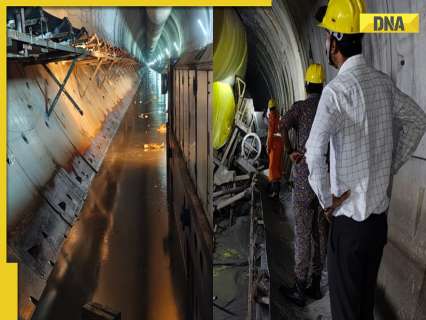Now Reading: Telangana Tunnel Collapse: Rescue Operations Continue to Save 8 Trapped Workers
-
01
Telangana Tunnel Collapse: Rescue Operations Continue to Save 8 Trapped Workers
Telangana Tunnel Collapse: Rescue Operations Continue to Save 8 Trapped Workers

Swift Summary:
- Rescue operations are underway for eight trapped workers in Telangana’s Srisailam Left Bank Canal (SLBC) tunnel after its roof collapsed on Saturday morning at the 14 km mark near Domalapenta, Nagarkurnool district.
- The National Disaster Response force (NDRF), State Disaster Response Force (SDRF), and an Engineer Regiment of the Indian Army are involved in rescue efforts.
- NDRF teams have covered 13.5 km of the tunnel using locomotives, conveyor belts, and by walking but face challenges due to debris blocking the final 200 meters where workers are suspected to be trapped.
- Accumulated water between 11 and 13 km inside the tunnel is being removed before further rescue attempts can proceed.
- SDRF officials reported knee-deep mud blocking access to collapsed areas, complicating rescue efforts significantly.
- An Engineer Task Force from Secunderabad has been mobilized with specialized equipment, high-capacity pumps, medical detachment staff, and an Excavator Dozer for assistance following a request from Telangana’s Chief Secretary.
Indian Opinion Analysis:
The ongoing rescue operation in Telangana highlights both the urgency and complexity involved when responding to industrial accidents. The involvement of multiple agencies such as NDRF, SDRF, Army specialists emphasizes a commendable level of coordination across governmental units. However, challenges such as important debris blockage and water accumulation inside tunnels indicate critical procedural risks tied to infrastructure projects-especially when work resumes after long hiatuses without rigorous safety evaluations.While rapid deployment of resources reflects seriousness from authorities following worker entrapment incidents, this accident underscores pressing national issues regarding workplace safety protocols in construction sites. for India broadly-and states like Telangana facing large-scale infrastructure expansion-the lessons learned here should drive policy reforms toward preventive measures rather than reactive interventions during crises.























